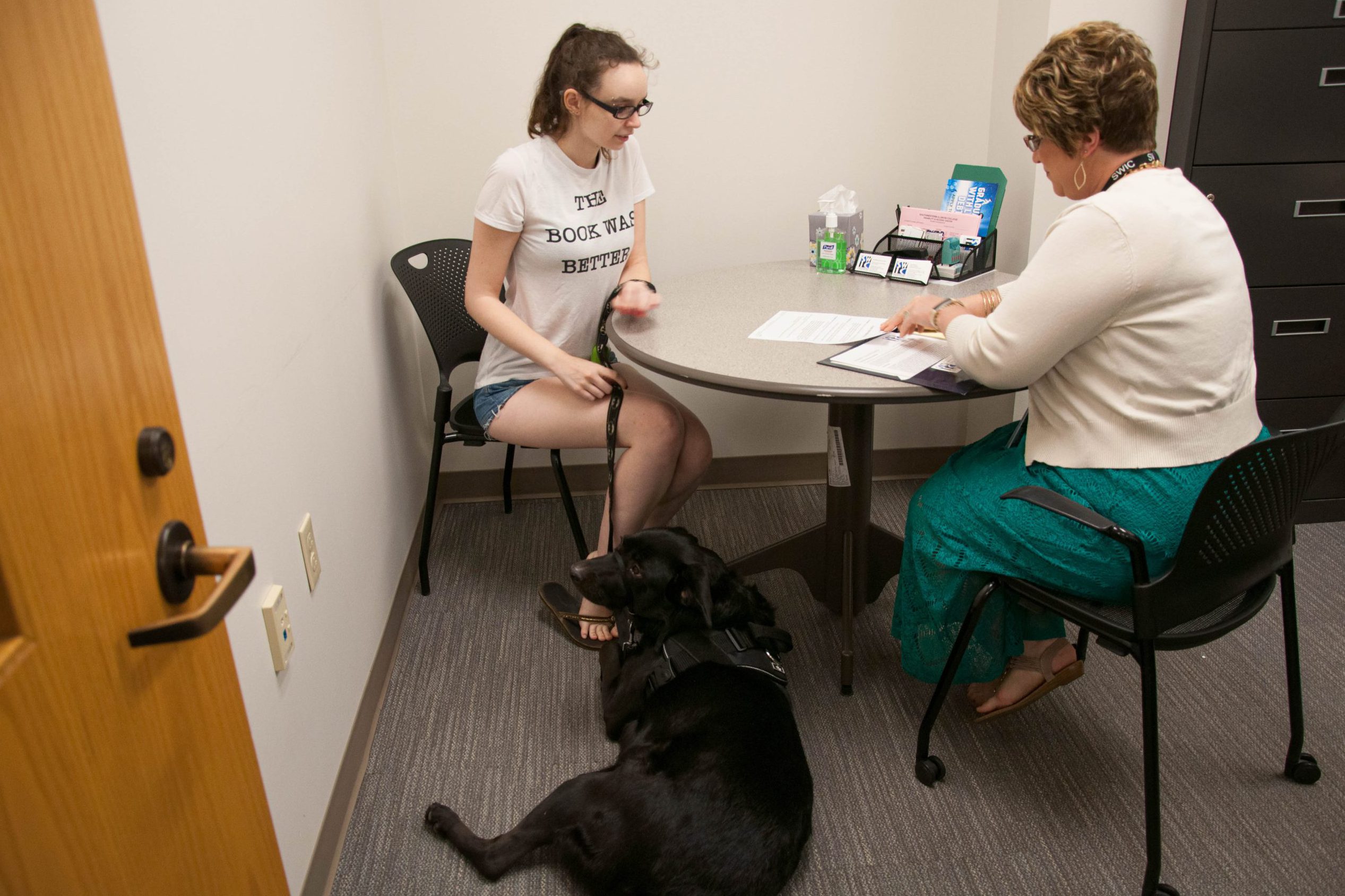It is the policy and practice of Southwestern Illinois College (SWIC) to fully comply with Section 504 of the Rehabilitation Act of 1973, the Americans with Disabilities Act (ADA) of 1990, and the ADA Amendments Act enacted in 2009. Recognizing the value and need of service animals, SWIC allows individuals with disabilities to bring service animals to College classes, activities, services and programs.
Definition – Service Animal
A service animal is defined by the ADA as “any dog that is individually trained to do work or perform tasks for the benefit of an individual with a disability, including a physical, sensory, psychiatric, intellectual, or other mental disability. Other species of animals, whether wild or domestic, trained or untrained, are not service animals for the purposes of this definition.
The work or tasks performed by a service animal must be directly related to the handler’s disability. Examples of work or tasks include, but are not limited to, assisting individuals who are blind or have low vision with navigation and other tasks, alerting individuals who are deaf or hard of hearing to the presence of people or sounds, providing non-violent protection or rescue work, pulling a wheelchair, assisting an individual during a seizure, alerting individuals to the presence of allergens, retrieving items such as medicine or the telephone, providing physical support and assistance with balance and stability to individuals with mobility disabilities, and helping persons with psychiatric and neurological disabilities by preventing or interrupting impulsive or destructive behaviors.
The crime deterrent effects of an animal’s presence and the provision of emotional support, well-being, comfort, or companionship do not constitute work or tasks for the purposes of this definition.”
When an animal meets this definition, it is considered a service animal regardless of whether or not it has been certified or licensed by a training program as a service animal.
The College may not insist on documentation or proof of state certification before allowing the service animal to accompany the person with a disability. If there are any questions, Student Accessibility and Support Services should be consulted.
Eligibility and Compliance
- Students who are using service animals on campus on a regular basis are strongly encouraged to register with Student Accessibility and Support Services. There may be additional accommodations that can be provided to support your participation at Southwestern Illinois College. The handler will be in control of the service animal at all times.
- The handler will be in control of the service animal at all times.
- The animal must be on a leash at all times unless the service animal user is unable to use a leash, using the leash would harm the handler, or if the animal must perform a task without the use of a leash.
- Dogs must wear a vaccination tag. The College reserves the right to ask for proof of current vaccination.
- The College reserves the right to ask that the animal be removed if it becomes disruptive or displays threatening behavior toward others. Each situation will be considered individually.
- The College may prohibit the use of service animals in certain locations if it poses a direct threat to the health or safety of others or where service animals may be in danger. Such locations may include, but are not limited to, metal/machine shops, welding rooms, and medical clinical sites. Exceptions to restricted areas may be granted on a case-by-case basis.
- The College is not responsible for the care or supervision of a service animal.
- The service animal must be housebroken.
- In a provision of ADA, a miniature horse may qualify as a service animal if the miniature horse has been individually trained to do work or perform tasks for an individual with a disability. Specific assessment factors will be considered in determining whether reasonable modifications in policies, practices, or procedures can be made to allow a miniature horse into a specific facility.
- Consideration of others must be taken into account when providing maintenance and hygiene of service animals.
Conflicting Disabilities
It is possible for a person, who does not use a service animal, to have a disability that precipitates an allergic reaction to animals. Persons who wish to make an asthmatic/allergic/medical complaint about the animal should contact Student Accessibility and Support Services. The person making the complaint must show medical documentation to support that complaint. Action will be taken to consider the needs of both the complainant and the handler of the service animal in order to resolve the problem as efficiently and expeditiously as possible.


